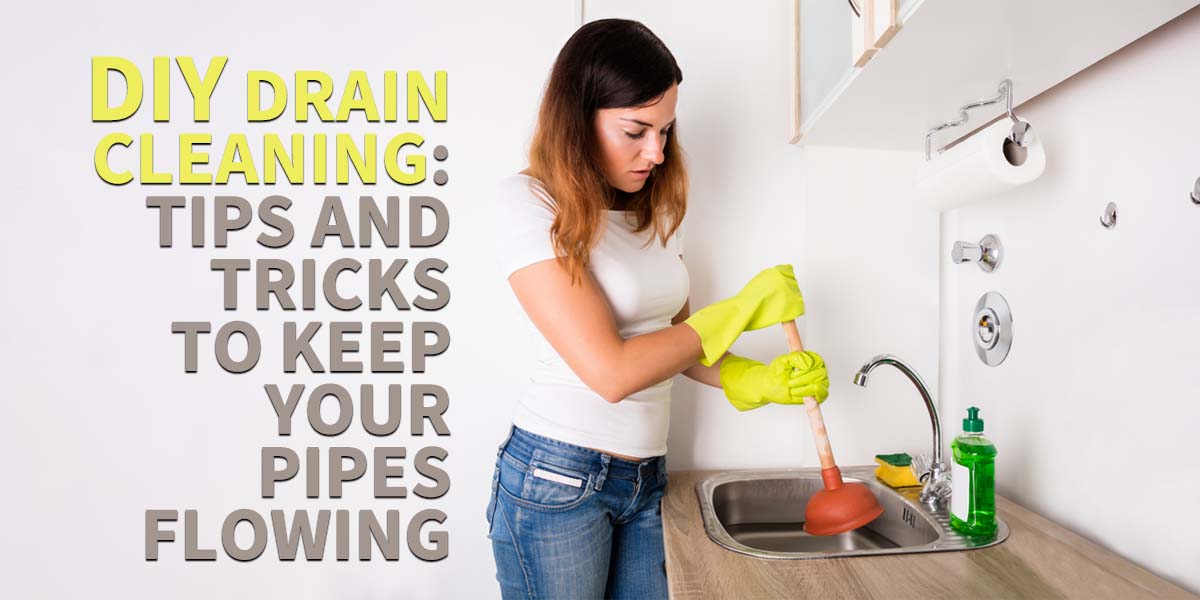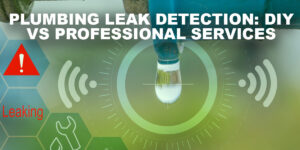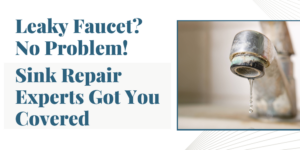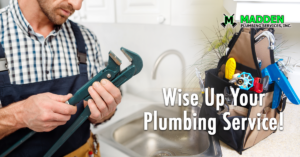DIY Drain Cleaning: Tips and Tricks to Keep Your Pipes Flowing
Clogged drains are a nuisance, but there’s no need to call an expensive plumber when you can easily tackle the job yourself. Whether you’re dealing with a kitchen sink clogged with food, or a bathroom drain clogged with hair and soap scum, it’s essential to know the proper steps for DIY drain cleaning. From using chemical cleaners to snaking a clog from the pipe, there are many ways to quickly and efficiently clean your drains. This blog post will discuss the different drain cleaning techniques, products, and tips for getting the best results. You can keep your pipes flowing without waiting for professional help with simple steps and the right tools.
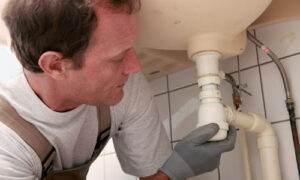
What Causes Clogged Drains and Pipes
Clogged drains and pipes are common plumbing issues. The most typical cause of a clog is the accumulation of hair, grease, and food particles that build up over time. When this occurs, people only sometimes need to call a plumber, despite popular belief. You can complete the task with the right tools and information.
Furthermore, it’s essential to take preventative measures for your home’s plumbing system; regularly running hot water down your drains and cleaning out the trap under your sink can help prevent future clogs. Periodically checking for damage or blockages can also save you from significant problems in the long run.
Likewise, you should be aware of certain items that can cause significant buildup and eventually lead to blockages if put down your drains, such as cooking oils, coffee grounds, and fibrous materials like eggshells. Taking these steps can help keep your pipes flowing freely.
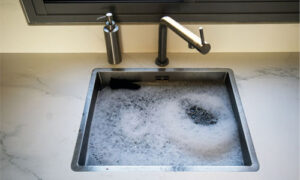
Tips for Preventing Clogs
Prevention is vital when it comes to keeping your drains clog-free, and there are a few simple things you can do. First, be mindful of what you’re putting down the sink or into drains. Avoid pouring things like cooking grease down the drain, as it can solidify in the pipes and become a significant issue. Additionally, always run cold water for a few seconds after washing dishes or putting food down the disposer to keep fats from congealing on the side of the pipes.
Moreover, use filters in all kitchen sinks to catch food particles that might otherwise clog up your system. Regularly clean out these filters and dispose of collected material in the trash rather than running it through your plumbing system. If you have especially troublesome drains, consider using enzymatic cleaners at least once a month, as they help dissolve organic material and break up odors caused by bacteria buildup.
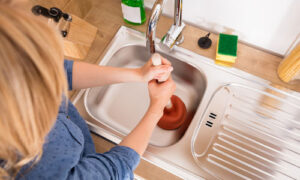
A Guide to Drain Cleaning
Cleaning your drain can be daunting, but it doesn’t have to be. You can unclog your drains quickly and efficiently with simple tips and tricks. Here’s what you need to know before tackling the job:
Step 1: Inspect the Blockage
You must identify the location of the clog before beginning any drain cleaning job. It will help you determine the best method of clearing it. Scrutinize the sink and ensure no visible obstructions in the pipes.
Step 2: Gather Your Supplies
Before beginning any DIY plumbing project, having all the required materials is crucial. Depending on the type of blockage in your pipes, you’ll need a plunger, drain snake, or chemical cleaner. Use gloves and safety goggles if using a chemical cleaner, as they can be dangerous if misused.
Step 3: Try Natural Methods First
Try using natural methods before using more robust measures such as chemicals or a drain snake. Using boiling water or a mixture of vinegar and baking soda can help clear away simple blockages quickly and safely without damaging your pipes.
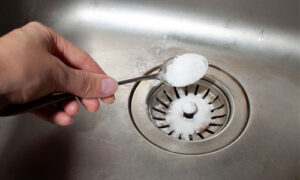
Home Remedies for Unclogging Drains
You can use several home remedies to unclog and keep your drains flowing. Most household staples are safer, easier, and more cost effective than purchasing an expensive snake or a chemical drain cleaner from the store.
a. Unclog Drains by Boiling Water
One of the most common methods for clearing a clogged drain is to pour boiling water down the afflicted area. Boil a pot of water, remove the heat, and slowly pour it down your sink’s drain or any other clogged drain in your home. The hot liquid should break up most obstructions that have caused the blockage.
b. Baking Soda & Vinegar
Baking soda and vinegar mixed in a basin or cup and poured down the clogged drain and let to sit for about 30 minutes before being rinsed out with hot water is another method that could be beneficial. This combination creates a foaming reaction that helps break up any pipe buildup.
c. Salt & Baking Soda
This solution is helpful in unclogging minor clogs such as hair or soap scum buildup. Mix one cup of salt with one cup of baking soda, pour the mixture down your drain, followed by boiling water to help dissolve and break apart any debris causing the blockage.
No matter which home remedy you choose, it’s essential to follow through with regular maintenance, such as pouring hot water down your drains every few weeks to help keep them clear of any possible buildup before it gets out of hand.
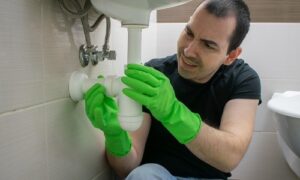
Warning Signs of a Serious Drain Problem
Knowing the warning signs of a severe blockage can save you from spending too much money on costly repairs. These warning signs include:
- Unusual or foul odors coming from the drains
- Water draining slowly, or not at all, in sinks, tubs, and toilets
- Gurgling and bubbling sounds coming from the drain pipes
- Multiple drains backing up at once
Addressing these problems as soon as they arise is essential to avoid further damage to your plumbing system. If left unaddressed, blocked drains can cause expensive plumbing repairs – try these DIY tips and tricks to help keep your pipes flowing smoothly!
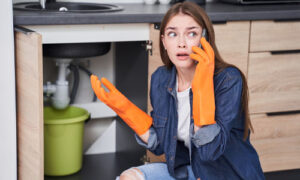
When to Call a Professional Plumber
No matter how well you care for your drains, you may still need a professional plumber. While most drain cleaning is manageable with intelligent techniques and the right products, serious clogs require a skilled hand. Here are some indicators it’s time to call in the reinforcements:
a. Persistent Blockages
Call a plumber if your drain remains clogged for more than 24 hours. Persistent blockages can indicate significant issues in your pipes that require special tools and knowledge to fix.
b. Unpleasant Odors
If you notice any nasty odors coming from your drains, this can indicate sewage backups in the pipes. Sewage backups create dangerous waste, making it essential to enlist the help of professionals as soon as possible.
c. Slower Drains
Slow-draining sinks and bathtubs can be caused by several issues, including pipe blockages caused by debris or root infiltration. If plunging and snaking alone don’t do the trick, call a professional plumber to diagnose the problem and get your drains flowing normally again.

Say Goodbye to Clogged Drains!
Overall, DIY drain cleaning is a great way to keep your pipes flowing with minimal effort. With suitable materials and basic knowledge, you can quickly unclog a drain and keep your home running smoothly. However, when the blockage is more profound in the pipe or has caused damage, it’s essential to know when to call a professional for help. Knowing when to call a plumber can save time and money and help you keep your lines problem-free.
